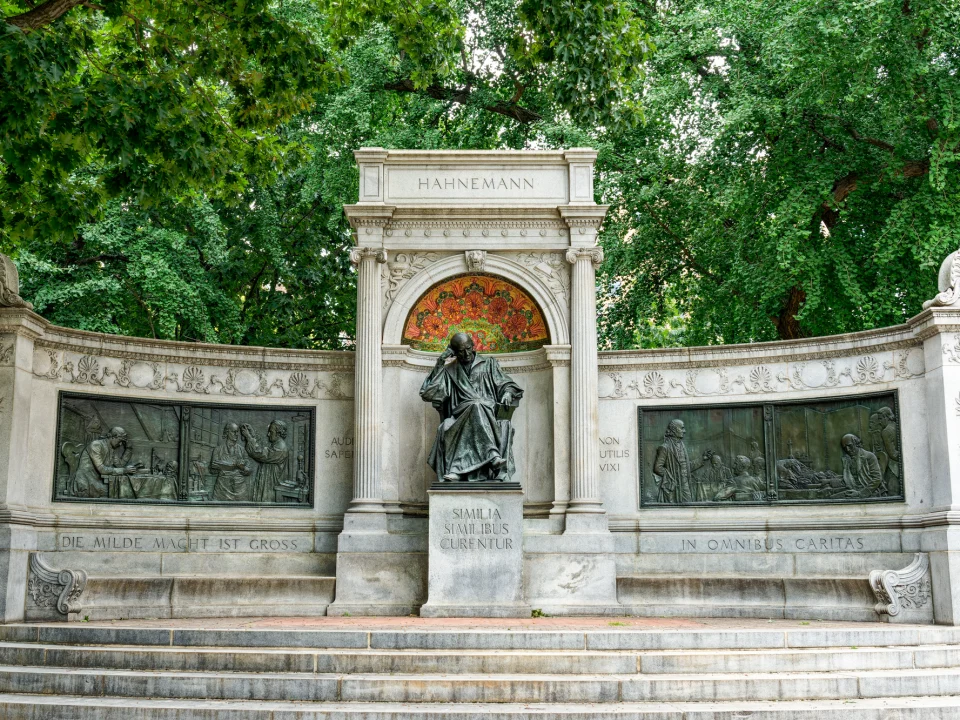„The homeopathic interview is a crucial meeting point and a very important one in the life not only of the patient but also of the physician. It is …a meeting of two beings at the right time, at the right place for the right purpose: to bring out the real “good” which is in both. ..What does it mean that an individual decides to go to a homeopath and what are the implications and the objective of such a consultation? It means that the individual is suffering and that you are willing to try to relieve his suffering.“
These are the words of Prof. George Vithoulkas from his inaugural speech, "The Necessity for an Inner Preparation of the Classical Homeopath," delivered to graduating homeopathic doctors upon completing their four-year education at the International Academy of Classical Homeopathy on the Greek island of Alonissos. Founded in 1995, this Academy has since trained numerous medical doctors worldwide who have recognized homeopathy as their mission for further helping patients. For his extraordinary contribution to revitalizing the original knowledge of homeopathy as postulated by Dr. Samuel Hahnemann —and further developed and applied by other prominent physicians and teachers such as Dr. C.M.F. von Bönninghausen, Dr. J.T. Kent, Dr. A.H. Grimmer, Dr. T.P. Paschero, Dr. P.S. Ortega, among others—Prof. Vithoulkas was awarded the "Right Livelihood Award" (known as the "Alternative Nobel Prize") in 1996 for training homeopaths to the highest standards.
So, from a homeopathic perspective, what does it mean that an individual is suffering and that we are ready to attempt to alleviate their suffering? What legacy has been passed down to us through the work and experience of brilliant humanitarian and philosophical minds such as Hahnemann, von Bönninghausen, Kent, Paschero, Ortega, and Vithoulkas? What role do empathy, love, and understanding play in alleviating human suffering from a homeopathic perspective?

Dr. Clemens Maria Franz von Bönninghausen, a key figure in classical homeopathy, did not explicitly write about empathy, love, and understanding in an emotional or philosophical sense, as later homeopaths like James Kent, Thomas Paschero, or Proceso Sánchez Ortega did. However, his writings and methodology inherently reflect these principles through a holistic understanding of patients’ physical and emotional-mental states. This requires deeply empathetic engagement with patients and acknowledgment of their uniqueness, achieved through deep listening and an unprejudiced approach to uncover subtle but critical aspects of their condition. He particularly emphasized the concept of interconnected and seemingly unrelated symptoms (the doctrine of concomitant symptoms). All of this transcends the treatment of disease, encompassing the recognition of the patient as a whole person. His collaboration with Hahnemann and his life’s work demonstrate a profound sense of duty and dedication to homeopathy, as well as a love for humanity and a desire to alleviate human suffering through the science of homeopathy and its transformative potential.
While Bönninghausen's focus was more scientific and systematic, his respect for patient individuality and tireless efforts to advance homeopathic practice laid the foundation for more spiritually-oriented homeopaths like Kent, Paschero, and Ortega. These later thinkers explicitly articulated the principles of empathy, love, and understanding in their approach to patients. For them, empathy in homeopathy was not merely understanding patients’ symptoms but deeply connecting with their emotional and spiritual essence. Proceso Sánchez Ortega emphasized the role of miasms (predispositions to chronic diseases) in shaping a patient’s entire being—physical, emotional, and spiritual. Empathy enables the practitioner to uncover hidden layers of a patient’s suffering, paving the way for deeper healing. He highlighted the intellectual and emotional understanding of miasms, encouraging practitioners to delve into inherited patterns of illness affecting one’s life. Understanding these patterns requires both intellectual precision and intuitive insight.

Thomas Pablo Paschero viewed the homeopath as a "humanitarian artist," advocating for a love-based approach and attentive listening. He suggested that the practitioner must resonate with the patient’s emotional frequency to truly understand their constitutional type and life struggles. He extensively discussed love as a therapeutic tool, seeing it as a bridge connecting the practitioner to the patient’s inner world. This connection fosters trust, enabling the exploration and resolution of the root causes of their ailments. James Tyler Kent emphasized the importance of recognizing the "soul of the remedy" and the "soul of the patient." He believed that genuine homeopathic healing occurs when the practitioner sympathizes with the patient’s inner state and finds a remedy matching their unique spiritual and emotional vibrations. Kent approached understanding through a lens of spirituality and metaphysics, considering true understanding as requiring intuitive comprehension of the patient’s essence.
In the philosophies of these thinkers, empathy, love, and understanding are intertwined. Together, they create a therapeutic space where the practitioner becomes a healer, facilitating the patient’s journey toward self-awareness and balance. Patients feel deeply seen and heard, fostering therapeutic trust and openness. Empathy and understanding guide the practitioner in selecting a remedy that addresses the patient’s totality—physical, emotional, and spiritual—while love serves as a transformative energy that supports the patient in achieving harmony, addressing not only symptoms but also the underlying causes of their suffering.
These principles not only enhance the practitioner’s ability to heal but also honor the intrinsic wholeness and dignity of every patient.

„I am not talking today about your outer preparation that should have included a lot of study, especially great enthusiasm in order to overcome all the difficulties that will come in your way, and constant one pointedness that drives you all the time to learn with a relentless gathering of information. But if the desire to help the other persons is missing – if you do not really care what happens to your patient…For a brief period of time you could be successful, but then you will become very tired of yourself, tired of thinking and analyzing every case, tired of listening to patients. But if you really have the right preparation with enthusiasm and real desire to heal them, it is a great experience to see them come back and say they are not suffering any more. It is something almost bordering to the miraculous…“
Prof. George Vithoulkas
References:
- “The Necessity for an Inner Preparation of the Classical Homeopath,” Prof. G. Vithoulkas, International Academy of Classical Homeopathy. https://www.vithoulkas.com/research/scientific-papers/necessity-inner-preparation-classical-homeopath/. Accessed Dec 26, 2024.
- Mariano Bitis, "Homenaje a Paschero," El Simillimum, Sept 12, 2017. https://elsimillimum.blogspot.com/2017/09/homenaje-paschero.html Accessed Dec 26, 2024.
- Susana Gutierrez de Orteg, "Aportes de Kent a la Filosofia Homeopatica." Accessed Dec 26, 2024.
- Ivan Dario Navas Dominigues, "Las enfermedades crónicas miasmáticas según Proceso S. Ortega," Homeopatia Pura, Aug 25, 2017. Accessed Dec 26, 2024.
- Proceso Sánchez Ortega, "Notes on the Miasms." National Homoeopathic Pharmacy, 1980.
- Thomas Pablo Paschero, Homeopathy, Beaconsfield Publishers, 2000.














